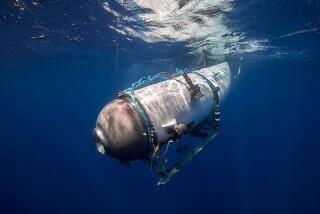Gaza aid flotilla anticipates high-seas standoff with Israel
A flotilla packed with hundreds of pro-Palestinian activists, food and other humanitarian supplies was headed for a high-seas standoff Sunday as it attempts to break Israel’s longstanding blockade of the Gaza Strip.
Israel has vowed to intercept the boats, tow them to the Israeli port of Ashdod and deport or arrest those aboard. The flotilla, which gathered Saturday in international waters off Cyprus, is expected to encounter Israeli naval boats as early as Sunday.
“We are determined to reach Gaza,” said Saman Ali, a Swedish national, speaking by satellite telephone from one of the vessels in the flotilla. “We are convinced that Israel’s siege of Gaza is illegal and we want to break it.”
The ships were delayed near Cyprus as they awaited about two dozen additional passengers, including 19 European legislators and a Holocaust survivor, the Associated Press reported. Organizers said the ships would start their 15-hour journey to Gaza at midnight Saturday.
It’s not the first time activists have attempted to reach Gaza by sea. Protest ships are usually turned back or escorted to Israel; rarely are they allowed to reach Gaza.
The flotilla, organized by Free Gaza and other pro-Palestinian advocacy groups, poses the biggest challenge yet for Israel because of the number of people aboard. Mechanical problems shrank the flotilla to five ships from eight.
Among the nearly 800 passengers are artists, writers, journalists and lawmakers from nearly 40 countries. In anticipation, Israel has set up tents and facilities to process arrest or deportation of the activists. Those willing to be deported will be given plane tickets to their home country; Israeli citizens will be arrested, officials said.
Israeli military officials said they would use force, if necessary, to block the vessels from reaching Gaza’s shores. In an attempt to reach Gaza in 2008, activists said an Israeli navy ship rammed their boat.
“We will not allow this flotilla to pass,” Israel’s deputy foreign minister, Danny Ayalon, said Saturday. “It is a blow to Israel’s security.”
Flotilla organizers and leaders in Gaza, which is controlled by the militant Palestinian group Hamas, are already declaring victory. They say Israel’s refusal to permit food, clothing, school supplies and other humanitarian goods from being delivered by the flotilla has put an international spotlight on Israeli policy in Gaza.
Since 2007, Israel and, at Western behest, Egypt, have tightly restricted the passage of people and goods across Gaza’s borders, citing concern about Hamas’ refusal to renounce violence. Israel, which controls the airspace and waters around Gaza, also imposed the restrictions in response to the June 2006 capture of Israeli soldier Gilad Shalit, who is being held by Hamas-linked groups in Gaza.
As a result of the restrictions, poverty and unemployment in Gaza has soared. Though many food items and essential goods are available in Gaza, they cost more than many families cannot pay. More than 60% of Gaza households are “food-insecure” and more than 80% of the population relies on international aid, according to the United Nations.
Israeli government spokesman Mark Regev dismissed the flotilla as a “cheap political stunt.” Israeli officials say that the activists are more concerned about generating publicity than assisting residents of Gaza, and that Israeli offers to deliver the humanitarian supplies through existing channels were rejected by flotilla leaders.
Israel defends the Gaza blockade as essential to fighting terrorism and denies there is a humanitarian crisis in the enclave.
In recent months, Israel has relaxed some restrictions, recently permitting trucks with limited amounts of clothing and cement to enter. Most of the 12,000 homes damaged or destroyed by Israel’s 22-day military offensive against Gaza last winter have not been rebuilt because the import of most building supplies is banned.
Israel said it launched the offensive in response to rocket attacks against its southern towns.
Some in Israel are calling for the government to reevaluate the blockade, saying it has done little to speed the release of Shalit or weaken Hamas’ grip on power.
“Israel is finding it increasingly difficult to explain the rationale behind the blockade to the rest of the world,” said an editorial published Friday in the Israeli newspaper Haaretz. The price of lifting the siege, the paper wrote, “may well turn out to be lower than the cost of the damage to Israel’s status.”
Batsheva Sobelman in The Times’ Jerusalem Bureau contributed to this report.
More to Read
Start your day right
Sign up for Essential California for news, features and recommendations from the L.A. Times and beyond in your inbox six days a week.
You may occasionally receive promotional content from the Los Angeles Times.






